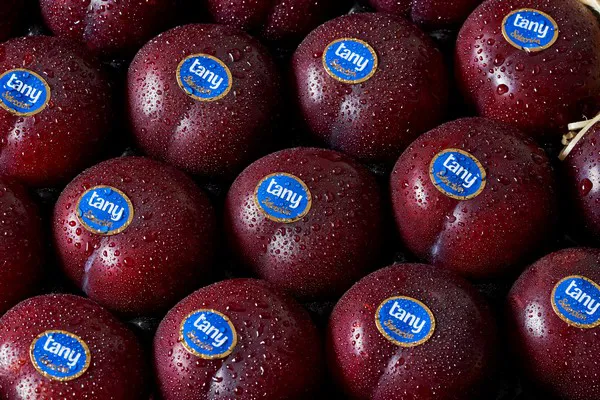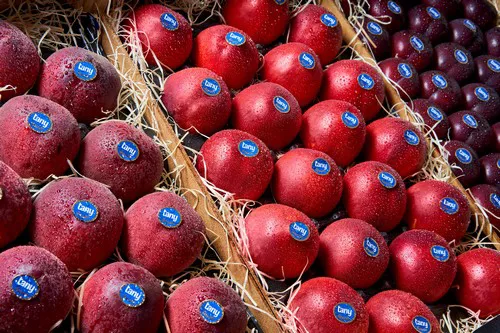The weather conditions have been good for the Spanish plum sector this season, while in the rest of Europe, other stone fruit crops have been severely hit by storms and frost in the spring. The region of Extremadura, and in particular the province of Badajoz, is Europe's main plum grower, according to José María Naranjo, Sales & Market Development Manager at Tany Nature. After harvesting the early varieties in western Andalusia, that is where their operations are now starting.

"Last year the yield was limited and the quality not so high. This year we have normal quantities, but we are quite happy with the quality," says José María. "During the winter, we've had enough hours of cold, and the weather has been good during the flowering, fruit setting and growth; quite unlike other areas, which have had to deal with storms and frosts. The quality of our plums is exceptional, both internally and externally, with no damage to the skin. This year, consumers can count on quality plums from the get-go."
According to José María, the company's stone fruit harvest will reach 68 million kilos this year and the season will continue until November. The harvest has just started in Vegas Altas, in the east of Mérida, where the plums are now almost at their optimal point of ripeness. "But there are always growers who make the mistake of starting too early and picking the fruit before it has reached that point. This seems to be a difficult shortcoming to overcome. In a year when the quality is spectacular and the fruit is quickly turning a nice color, the temptation to harvest a little too early is still there."
"Tany is both a grower and a packer, which helps us to operate in an efficient and, above all, sustainable way. We certainly hold sustainability in high regard, and on three levels. Firstly, the cultivation has to be profitable, so that we can continue to innovate and surprise our customers every year; in other words, it has to be economically sustainable. We also care about environmental and social sustainability, since each hectare devoted to cultivation generates 1.5 jobs, which helps prevent depopulation in rural areas."

Tany Nature is strongly export-oriented. The company's plums, the flagship product of its stone fruit range, are exported to 58 countries. Last year, however, it didn't go so well for exports. Not only was there the pandemic and the uncertain situation surrounding Brexit, for which an agreement was only reached in the last minute, but the Brazilian market also suddenly closed its doors to Spanish plums. Not to mention the worrying price crisis that has been dragging on for several years.
The field cannot continue producing while failing to cover its costs
"In recent years, costs have risen significantly. The salaries paid are now 38% higher more than a few years ago and the cost of inputs has increased by 18%. In the last two years, we have seen an overall increase in production costs of 56%. We really need a decent price for the fruit," says José María.
"In Extremadura, 2,800 hectares of stone fruit trees were uprooted last year and some growers have been forced to quit their activity," he says. "Stone fruit growers have been seeing their profits erode year after year, and of course, that cannot continue," he says.
"Our sector needs dynamism. Not only the growers themselves must keep an eye on the weather or on anything going on that can affect the crops; governments should be much more involved, because our work makes a relevant social contribution. For example, we ask the government not only to make efforts to open up new markets, but also to make sure that existing ones do not suddenly close down or become difficult to access, with all kinds of requirements that prevent us from exporting in decent conditions," says José María Naranjo.
China has been one of the latest markets to open its doors to Spanish stone fruit. The negotiations between the two countries did take a long time. "In my opinion, the Chinese market is more of a niche market. They are ultimately the largest stone fruit growers in the world, and reaching that market after a 30-day shipment with a competitive product that can outdo local fruit in terms of quality isn't easy. We all have to be aware that we have to reach the export markets with the quality they demand. At Tany Nature, we have that know-how, but China is a market that won't allow any mistakes, and there are few companies able to meet their demands."
"It's in our DNA to handle the fruit in such a way that it gets to the customer and consumer in the best condition. And while we're good with long distance shipments, we are excellent with the short ones. All that experience we have gained in overseas markets allows us to supply the domestic market with exceptional quality. And by domestic market we mean all of Europe," he says.
 For more information:
For more information:
José María Naranjo
Tany Nature
+34 627960234
jnaranjo@tany.es
www.tanynature.com
